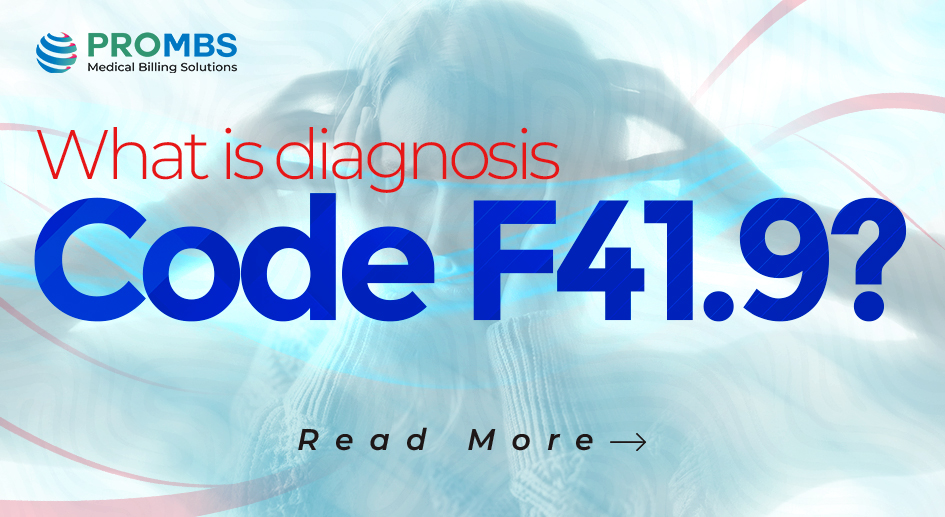Introduction
ICD-10 Code F41.9 is a billable diagnosis code used for the identification and reimbursement of Anxiety Disorder, Unspecified. This specific code is often applied when a patient’s symptoms meet the diagnostic criteria for anxiety but do not clearly fall into a distinct subtype. It corresponds to ICD-9 code 300 and is widely used by healthcare providers to streamline coding, billing, and compliance with payer requirements.
What is Anxiety Disorder, Unspecified (F41.9)?
Anxiety Disorder, Unspecified, is a classification within the types of anxiety recognized in ICD-10. It is diagnosed when excessive worry, fear, or related symptoms are present but cannot be clearly categorized as F41.0 Panic Disorder, social phobias, or other specified anxiety disorders. This diagnosis ensures accurate recordkeeping and supports appropriate treatment planning.
Synonyms for Anxiety Disorder (F41.9)
Anxiety
Anxiety disorder
Anxiety in childbirth
Anxiety in pregnancy
Anxiety antepartum (before childbirth)
Postpartum anxiety (after childbirth)
Chronic anxiety
Symptoms of Unspecified Anxiety Disorder (F41.9)
Common symptoms include:
Persistent worry or fear
Restlessness or feeling on edge
Irritability
Difficulty concentrating
Muscle tension
Sleep disturbances
Fatigue
In some cases, symptoms may escalate into panic attacks or be accompanied by physical sensations such as palpitations, sweating, and dizziness. These symptoms can have a significant side effect on daily functioning, work performance, and personal relationships.
Causes of Unspecified Anxiety Disorder (F41.9)
Although the exact cause is not always identifiable, common contributing factors include:
Genetic predisposition
Environmental stressors
Neurobiological imbalances
Traumatic experiences
Chronic medical conditions
Differential Diagnosis for Unspecified Anxiety Disorder
Healthcare providers use diagnostic criteria and thorough patient evaluations to distinguish F41.9 from other types of anxiety, including:
F41.0 Panic Disorder (characterized by recurrent panic attacks)
Social Anxiety Disorder (social phobias)
Generalized Anxiety Disorder (GAD)
Post-Traumatic Stress Disorder (PTSD)
Major Depressive Disorder
Is Unspecified Anxiety Disorder Serious?
Yes. If untreated, F41.9 can lead to:
Chronic stress
Interference with daily activities
Strained relationships
Decreased productivity
Higher risk of developing additional mental health disorders
Treatment for Unspecified Anxiety Disorder (F41.9)
Effective management often involves a combination of:
Psychotherapy: Cognitive-behavioral therapy (CBT) is effective across various types of anxiety
Medications: Antidepressants, benzodiazepines, beta-blockers
Lifestyle changes: Exercise, diet, mindfulness practices
Support groups: Shared experiences help reduce isolation
Billing & Coding Guidelines for ICD-10 Code F41.9
When submitting claims for diagnosis code F41.9:
Ensure accurate patient information and visit documentation
Use the correct specific code and corresponding CPT codes
Apply appropriate modifiers when needed
Follow payer-specific coding guidelines to avoid denials
Preventing Claim Denials:
Verify all required details are complete
Match the diagnosis code with correct procedure codes
Adhere to insurer-specific submission rules
Why Choose PROMBS for Medical Billing Solutions?
We ensure accurate claim submission, strict compliance with coding guidelines, and maximum reimbursement for providers treating anxiety disorders, from F41.0 Panic Disorder to social phobias and other mental health conditions.
Let our expert billing team handle the complexities so you can focus on patient care.
📞 Call for a Free Quote: (725) 237-2757
